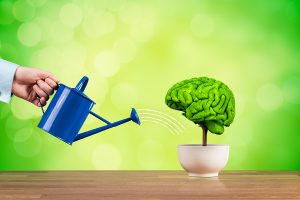 What foods should seniors eat to protect their brains from decay? Is there a best brain healthy diet?
What foods should seniors eat to protect their brains from decay? Is there a best brain healthy diet?
For the last few years, I have been reading about diets, searching for the best way for healthy seniors to eat. I don’t mean “diets for weight loss,” although that can happen too. Perhaps “a brain healthy eating plan” is a better term rather than diet.
I’ve had a 360-degree turnabout in my thinking about what’s healthy eating. Ever since the 70s when I was modeling in Paris, I always ate low or nonfat items. I thought I was eating healthy, Admittedly, I often felt hungry, and quite often, immediately after eating, I craved more food. I rarely felt satiated. I’ve since found out that satiety is triggered by the consumption of fats and proteins, rarely by lettuce and broccoli.
From Low-Fat to Healthy Fats
About ten years ago I started reading about the Atkins Diet, and subsequently, the ketogenic diet which has turned into a huge food trend. For good reason. So many good results are attributed to a diet high in healthy fats, low in carbohydrates, with moderate protein.
Healthy fats are rich in omega-3’s as opposed to what we find in the American diet, an excess of omega-6 oils processed from vegetables. Today I only use olive oil, coconut and avocado oils.
Why a Keto Diet Is Good for Brain Health
The keto diet has been used as a treatment for seizures for the last 80 years and is being tested as a treatment for cancer. Many claim it contributes to longevity. Dr. Dale Bredesden, a leading Alzheimer’s expert, recommends it for his dementia patients. Here is what he reports from his book The End of Alzheimer’s Program: The First Protocol to Enhance Cognition and Reverse Decline at Any Age.
Dr. Bredesden recommends a KetoFLEX 12/3 version of the ketogenic diet.
KetoFLEX 12/3 specifically focuses on the mechanism known to contribute to cognitive decline. This lifestyle will:
- Create critical insulin sensitivity
- Reduce inflammation
- Address neuronal fuel reduction and mitochondrial deficiency
- Improve circulation and optimize blood pressure
- Provide raw materials for synaptic support
- Protect against nutrient deficiencies associated with cognitive decline
- Promote cellular autophagy and beta-amyloid clearance
- Promote detoxification
- Protect against muscle and bone loss associated with cognitive decline
Here’s a great article over on the Apollo Heath site that explains KetoFLEX:
What exactly is KetoFLEX 12/3? Let’s break it down. Keto refers to ketosis, the process by which your liver breaks down fat as an energy source and produces a compound called ketone bodies to fuel your brain.
The Flex portion refers to two concepts. First, the diet promotes “metabolic flexibility,” the ability to burn either glucose or fat as fuel to maximize fuel supply to your brain. Second, the diet may be “flexitarian” or meat optional.
12/3 refers to the recommended daily fasting time, a minimum of 12 hours total with at least 3 before bed. A long daily fast promotes autophagy or cellular housekeeping— a process by which your body recycles worn-out cellular debris to make new cellular parts.
Best Brain Healthy Diet for Seniors
Why wait until you have signs of neurodegenerative brain problems? You don’t have to have a diagnosis to start eating right for brain health. I say, if it’s good for people with brain disease, it’s good for me too.
There are other brain healthy diets to explore. For example, the MIND diet, a blend of Mediterranean and the DASH diet. I suggest reviewing the major diets. Here’s a link to an expert analysis of the best diets on U.S. News Health site.
The way I see growing older is that I can adjust to some of the indignities and infirmities, but I want to keep my memory, motivation, and love for life. I recently replaced my right shoulder joint. But we can’t replace our brains, lost neurons and malfunctioning synapses.
If eating way less carbohydrates, healthy fats, and moderate protein keeps my brain healthy, I’ll do it. Most of the carbs I eat come from vegetables and some fruit. I limit bread, pasta, and avoid cereal and many of the processed foods found on grocery shelves.
Choosing what to eat is a personal decision. It’s up to you to decide what’s best for you, and what guidelines you’ll stick with.

Recent Comments